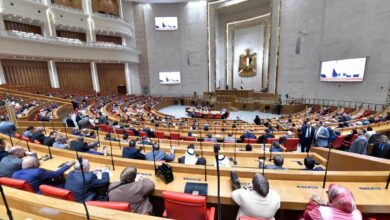
You can hardly believe that Abdul Hamid al-Dabaiba, the head of the so-called National Unity Government in western Libya who inspired his Foreign Minister to hold a secret meeting with her Israeli counterpart in Rome, is the same Dabaiba who rushed to visit his country’s Palestinian embassy to take pictures with its officials!
There, he seemed to be trying to wash his hands of what had happened – but things are never so easy.
As soon as news of the meeting leaked, Dabaiba knew that he was in big trouble.
It was trouble that would not be alleviated by his visit to the Palestinian embassy in Libya, nor by him appearing while wearing the distinctly Palestinian Kufiyah, nor while he stood with embassy officials, managing his actions, in front of two pictures: one showing the heroic Omar al-Mukhtar, the other of Palestinian President Mahmoud Abbas.
Perhaps we should make clear to every Arab official of Dabaiba’s caliber by noting that when Egypt decided to make peace with Israel, it did so transparently.
The great Sadat visited Israel, offering peace in exchange for the return of all the occupied lands, be they Egyptian or Arab at the time. Contrary to what malicious actors claim, it is not true that he went to achieve peace for Egypt solely, nor that he sought to restore Egypt’s lands without restoring Arab ones as well.
We know this is untrue because the transcription of his speech at the Knesset is available for anyone to check, having been shared in more than one book such as “In Search of Identity: An Autobiography.”
Nothing Egypt did was in secret.
This was its policy at all times, and Sadat did not go to Jerusalem looking to legitimize his power because he knew his legitimacy was derived from his victory in the October War and from his people alone.
But what we see now is that more than one Arab country is afflicted by its government.
These governments in our miserable Arab world have begun to search for support outside their borders and not from its people, its citizens. The Libyan public’s reaction to the secret meeting was much stronger than what both Dabaiba and the Israeli government expected.
The photo of the head of the so-called unity government wearing the Kufiyah is little more than a miserable attempt to absorb the Libyan public’s anger against him.
His sense of shame at what he did grew so great that he announced he was dismissing the Foreign Minister, from inside the embassy.
This is surely a unique event, and also one that will serve to chronicle the extent of how far Arab political practices have declined in some of our capitals.
It is a decline so steep it saw Dabaiba, who announced from within the Palestinian embassy that the minister was banned from travel, help facilitate her escape to Turkey hours earlier!




